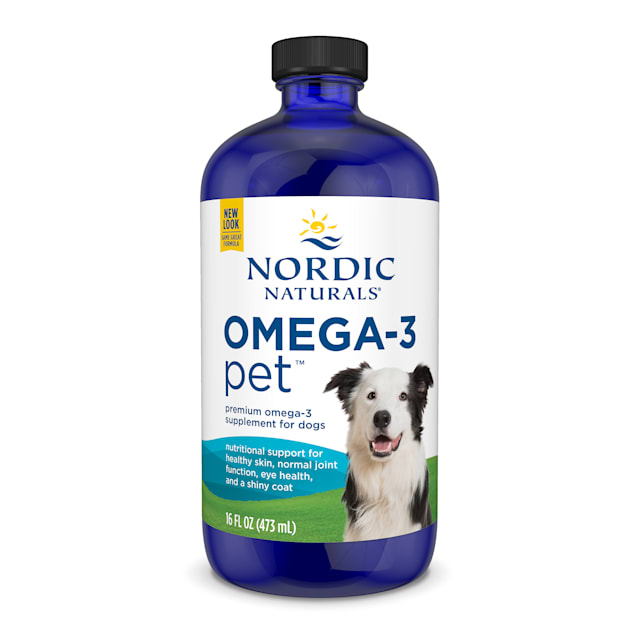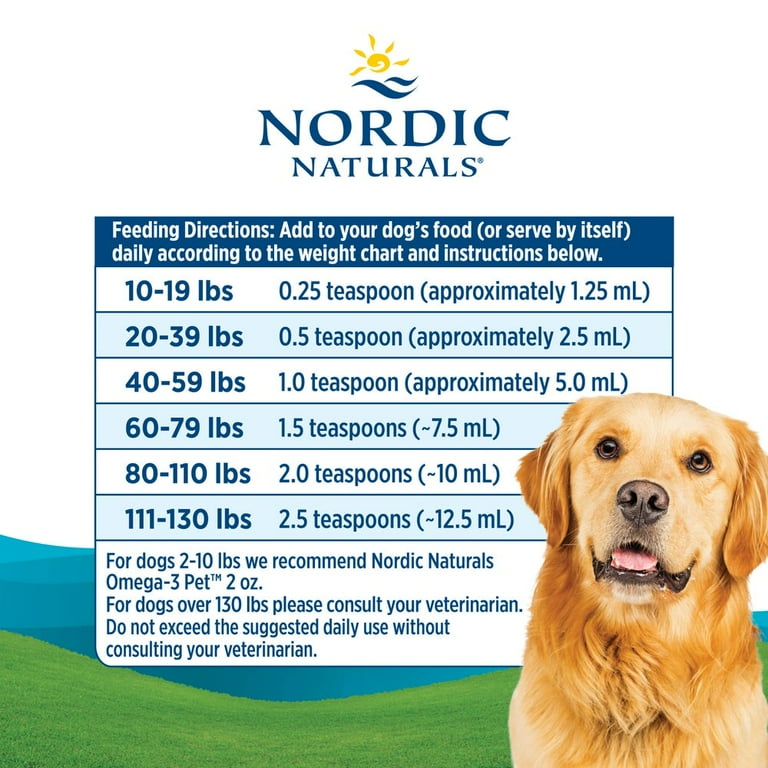Are you wondering how much fish oil your dog really needs? Giving your furry friend the right amount of fish oil can make a huge difference in their health, from shiny fur to a stronger immune system.
But too little might not help, and too much could cause problems. You’ll discover the simple, clear answers you need to keep your dog happy and healthy. Keep reading to find out the best way to add fish oil to your dog’s diet safely and effectively.

Credit: www.petco.com
Benefits Of Fish Oil For Dogs
Fish oil is a natural supplement that helps dogs stay healthy. It contains omega-3 fatty acids, which are good for many parts of a dog’s body.
Giving your dog the right amount of fish oil can improve their skin, joints, heart, and immune system. Let’s look at these benefits in detail.
Improving Skin And Coat Health
Fish oil helps keep your dog’s skin soft and less itchy. It also makes the coat shiny and healthy.
Omega-3 fatty acids reduce dryness and flakiness. Dogs with allergies or skin problems often feel relief from fish oil.
Supporting Joint Function
Fish oil helps reduce joint pain and stiffness in dogs. It supports healthy cartilage and reduces inflammation.
Dogs with arthritis or older dogs can move more easily when they take fish oil regularly.
Enhancing Heart Health
Fish oil supports healthy heart function in dogs. It helps keep blood pressure and cholesterol at good levels.
This supplement can lower the risk of heart disease and improve overall cardiovascular health.
Boosting Immune System
Omega-3s in fish oil help strengthen your dog’s immune system. This means your dog can fight infections better.
A stronger immune system helps keep dogs healthy and recover faster from illnesses.

Credit: www.amazon.com
Determining The Right Dosage
Fish oil is a popular supplement for dogs. It supports their skin, coat, and joint health.
Giving the right amount is important. Too little may not help. Too much can cause problems.
Factors Influencing Dosage
Several things affect how much fish oil your dog needs. Age, health, and diet all matter.
Check if your dog has any health issues. Some conditions need different dosages.
- Dog’s age and life stage
- Current health problems
- Type and concentration of fish oil
- Other supplements or medications
- Overall diet and nutrition
Recommended Daily Amounts
Fish oil dosage is often based on the amount of EPA and DHA. These are key omega-3 fats.
A general guideline is 20 to 55 mg of combined EPA and DHA per pound of body weight daily.
- Small dogs: 100 to 300 mg total daily
- Medium dogs: 300 to 700 mg total daily
- Large dogs: 700 to 1,500 mg total daily
Dosage By Dog Size And Weight
It helps to know your dog’s weight to find the right dose. Use the chart below as a guide.
| Dog Weight | Daily Fish Oil Dose (EPA + DHA) |
|---|---|
| Under 20 lbs | 100-400 mg |
| 20-50 lbs | 400-1,000 mg |
| 50-90 lbs | 1,000-1,500 mg |
| Over 90 lbs | 1,500-2,000 mg |
Always start with a lower dose. Watch your dog for any reactions. Adjust as needed.
Choosing The Best Fish Oil Supplement
Fish oil can help keep your dog healthy. It supports their skin, coat, and joints. Picking the right fish oil is important for your dog’s safety and health.
Not all fish oils are the same. Some are better for dogs than others. Learn about the types and qualities to choose the best one.
Types Of Fish Oil Available
Fish oil comes from many fish species. Common types include salmon, anchovy, and sardine oils. Each type offers different benefits and nutrients.
Some fish oils contain higher omega-3 fatty acids. These acids help reduce inflammation and improve heart health.
- Salmon oil: rich in EPA and DHA, good for skin and coat
- Anchovy oil: high in omega-3, often more affordable
- Sardine oil: contains omega-3 and vitamins A and D
- Cod liver oil: has vitamins A and D but less omega-3
Quality And Purity Considerations
Choose fish oil that is clean and pure. Low-quality oils can have toxins like mercury or PCBs. These are harmful to dogs.
Look for fish oil that is tested for purity. Third-party testing ensures safety. Check for oils that mention “molecularly distilled” or “purified.”
- Check for certifications from trusted labs
- Avoid oils with strong fishy odors
- Pick oils stored in dark bottles to prevent oxidation
- Choose products with clear ingredient lists
Forms: Liquid Vs Capsules
Fish oil comes in liquid and capsule forms. Each has pros and cons. Choose what fits your dog’s needs and your ease of use.
Liquid fish oil mixes easily with food. Capsules can be easier to give if your dog does not like liquid taste. Both forms offer similar benefits if dosed properly.
- Liquid: easy to mix, can spoil faster, needs refrigeration
- Capsules: convenient, no taste issues, may be hard to swallow
- Check dosage instructions carefully for each form

Credit: www.walmart.com
Potential Risks And Precautions
Fish oil can be helpful for dogs but it also has risks. Giving the right amount is very important.
Too much fish oil or wrong use can cause problems. You should know the risks before giving it to your dog.
Possible Side Effects
Fish oil may cause side effects in some dogs. These can be mild or more serious.
Common side effects include upset stomach and bad breath. Some dogs may have loose stools or vomiting.
- Diarrhea or loose stools
- Vomiting
- Bad breath
- Oily coat or skin
- Allergic reactions like itching or redness
Interactions With Medications
Fish oil can interact with some medicines your dog takes. This can cause health risks.
It may increase the chance of bleeding if your dog uses blood thinners. Always check with your vet first.
- Blood thinners (like aspirin or warfarin)
- Non-steroidal anti-inflammatory drugs (NSAIDs)
- Diabetes medications
- Immune-suppressing drugs
Signs Of Overdose
Giving too much fish oil can be dangerous. Watch your dog for overdose signs.
Overdose can cause serious health problems. Call your vet if you see these signs quickly.
- Excessive bleeding or bruising
- Diarrhea that does not stop
- Vomiting often
- Loss of appetite
- Weakness or lethargy
- Difficulty breathing
Frequently Asked Questions
How Much Fish Oil Should Dogs Get Daily?
The amount depends on the dog’s size. Generally, 20-55 mg of EPA+DHA per pound is recommended.
Can Fish Oil Harm Dogs If Given Too Much?
Yes. Excessive fish oil can cause diarrhea, vomiting, and blood thinning. Always follow recommended dosages.
Is Fish Oil Safe For All Dog Breeds?
Yes, fish oil is safe for all breeds. Consult your vet for specific breed needs and dosage.
What Are The Benefits Of Fish Oil For Dogs?
Fish oil supports joint health, improves coat shine, and boosts heart and brain functions.
How To Choose The Best Fish Oil For Dogs?
Look for high-quality, pure fish oil with no additives. Check EPA and DHA levels for effectiveness.
Conclusion
Giving the right amount of fish oil helps your dog stay healthy. Start with small doses and watch how your dog reacts. Too much fish oil can cause problems. Talk to your vet before adding fish oil to your dog’s diet.
Quality matters, so pick a good product. Regular use supports shiny fur, healthy joints, and a strong heart. Keep your dog happy and active with the proper fish oil dose. Simple steps make a big difference in your dog’s life.

